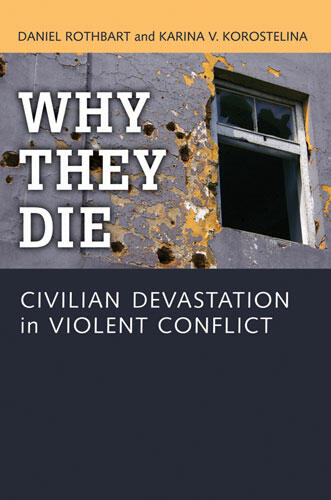When civilians are perceived as the enemy, atrocities and violence result beyond the battlefield
Description
Why do civilians suffer most during times of violent conflict? Why are civilian fatalities as much as eight times higher, calculated globally for current conflicts, than military fatalities? In Why They Die, Daniel Rothbart and Karina V. Korostelina address these questions through a systematic study of civilian devastation in violent conflicts. Pushing aside the simplistic definition of war as a guns-and-blood battle between two militant groups, the authors investigate the identity politics underlying conflicts of many types. During a conflict, all those on the opposite side are perceived as the enemy, with little distinction between soldiers and civilians. As a result, random atrocities and systematic violence against civilian populations become acceptable.
Rothbart and Korostelina devote the first half of the book to case studies: deportation of the Crimean Tatars from the Ukraine, genocide in Rwanda, the Lebanon War, and the war in Iraq. With the second half, they present new methodological tools for understanding different types of violent conflict and discuss the implications of these tools for conflict resolution.
Daniel Rothbart is Professor of Conflict Analysis and Resolution at George Mason University’s School for Conflict Analysis and Resolution.
Karina V. Korostelina is Associate Professor and Director of the Program on History, Memory, and Conflict at George Mason University’s School for Conflict Analysis and Resolution.
Reviews
"Why They Die is a work of imagination and insight. Based on wide reading and deep reflection, the authors have adopted a case study method to illustrate why it is that civilians are so often targeted in modern conflict, and why this development is such a departure from earlier forms of warfare. Rather than being that unfortunate phenomenon 'collateral damage,' as so often claimed by military theorists, the modern world has seen a situation where the destruction of civilian lives has all too often become the object of combatant behaviors. Rothbart and Korostelina have shown why this has happened, and how such behaviors can be explained. All in all, this is an excellent and worthy addition to a growing literature of mass murder, mayhem and destruction."
- Paul R. Bartrop
—Paul R. Bartrop, Bialik College, Melbourne, Australia
"A welcome contribution to our understanding of the process at work in societies in conflict—a process that can occur even before the fighting begins—this book convincingly argues the need to bring civilians, who are often not at the center of conflict analysis, to the forefront of any discussion of conflict through an examination of anti-civilian ideology and the construction of the Other in terms of the positioning of boundaries."
- Kristen P. Williams
—Kristen P. Williams, Clark University

